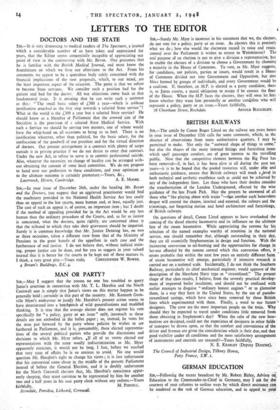LETTERS TO THE EDITOR 4
DOCTORS AND THE STATE
SIR,—It is very distressing to medical readers of The Spectator, a journal which a considerable number of us have taken and appreciated for years, that the Editor seems congenitally incapable of appreciating our point of view in the controversy with Mr. Bevan. One presumes that he is familiar with the British Medical Journal, and must know the foundations on which we base our objections to the Act. From his comments we appear to be a querulous body solely concerned with the financial implications of the new proposals, which, to our mind, are the least important aspect of the situation. The point is that we refuse to become State servants. We consider such a position bad for the patient and bad for the doctor. All bur objections come back to that fundamental issue. It is amazing that he can write such a sentence as this: " The small basic salary of £300 a year—which is without justification attackeO as the first step towards a salaried State service "! What in the world is the £300 a year but a salaried State service? He should know as a Member of Parliament that the avowed aim of the Socialists is the provision of a salaried State Medical Service. With such a Service we should be serving two masters, one of whont would have the whip-hand on all occasions to bring us to heel. There is no 'justification whatever, other than political, for the basic salary, for the confiscation of the goodwill of our practices and for the virtual direction of doctors. Our present arrangement is a contract with plenty of scope outside it in private practice if we do not desire to enter that contract. Under the new Act, to refuse 'to serve is to commit professional suicide. Also, whatever the necessity, no change of locality can be arranged with- out obtaining the consent of some local committee. We do not propose to hand over our profession to these conditions, and your optimism as to the ultimate outcome is certainly premature.—Yours, &c.,






































 Previous page
Previous page